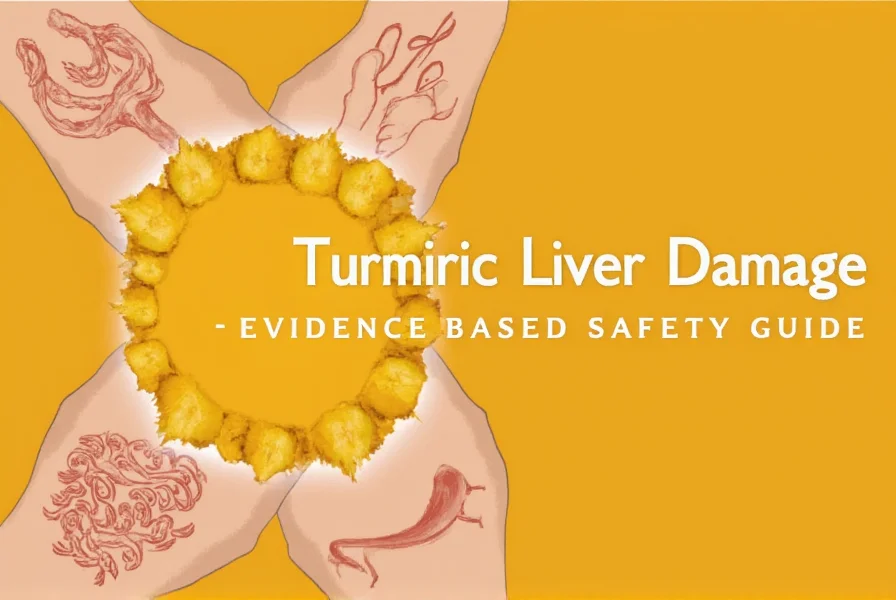As turmeric supplements grow increasingly popular for their anti-inflammatory properties, concerns about potential turmeric liver damage have emerged. This comprehensive analysis examines the scientific evidence behind these concerns, separating verified risks from misconceptions.
Understanding Turmeric and Liver Health
Turmeric, a vibrant yellow spice used for centuries in traditional medicine, contains curcumin as its primary active compound. While culinary use of turmeric in foods poses minimal risk, concentrated curcumin liver toxicity cases have been documented in medical literature. The distinction between dietary turmeric and high-potency supplements is crucial when assessing potential liver effects.

Scientific Evidence: Benefits vs. Risks
Research presents a complex picture of turmeric's relationship with liver health:
| Research Category | Findings | Key Studies |
|---|---|---|
| Liver Protective Effects | Multiple studies show turmeric may protect against liver damage from toxins, fatty liver disease, and inflammation | 2019 review in Food and Chemical Toxicology; 2020 study in Nutrients |
| Reported Liver Injury | Case reports link high-dose curcumin supplements (typically >1,000mg daily) to elevated liver enzymes and hepatitis | 2018 case series in BMJ Case Reports; 2021 review in Journal of Dietary Supplements |
| Population Risk | Estimated incidence of turmeric supplement liver problems is low (approximately 1-2 cases per 100,000 users) | 2022 analysis in Hepatology Communications |
Who's at Risk for Turmeric-Related Liver Issues?
Not everyone who takes turmeric supplements faces liver damage risks. Certain factors increase susceptibility:
- Pre-existing liver conditions - Those with hepatitis, cirrhosis, or fatty liver disease
- High-dose supplementation - Typically exceeding 1,000mg of curcumin daily
- Genetic factors - Variations in liver metabolism enzymes
- Medication interactions - Particularly with drugs metabolized by CYP450 enzymes
- Prolonged use - Continuous high-dose supplementation beyond 3-6 months
Research suggests that is turmeric hard on the liver primarily depends on these individual factors rather than being a universal risk.
Recognizing Potential Liver Damage Symptoms
If you're taking turmeric supplements, monitor for these potential signs of turmeric-induced liver damage:
- Unexplained fatigue and weakness
- Yellowing of skin or eyes (jaundice)
- Abdominal pain, particularly in the upper right quadrant
- Nausea, vomiting, or loss of appetite
- Dark urine and pale stools
- Elevated liver enzymes detected through blood tests
Should you experience these symptoms while taking supplements, discontinue use immediately and consult a healthcare provider. Most cases of turmeric and liver enzyme levels elevation resolve after stopping supplementation.
Safe Usage Guidelines
To minimize potential risks while benefiting from turmeric's properties:
- Stick to culinary doses - 1-3 grams of turmeric powder daily in food presents minimal risk
- Choose standardized supplements carefully - Look for products with third-party testing
- Maintain moderate dosing - Most experts recommend no more than 500-1,000mg of curcumin daily
- Limit duration - Consider cycling supplements (e.g., 8 weeks on, 2-4 weeks off)
- Monitor liver function - Those with liver concerns should get periodic blood tests
- Avoid on an empty stomach - Take with food to reduce potential irritation
When to Consult Your Healthcare Provider
Certain individuals should discuss turmeric use with medical professionals before starting supplements:
- People with diagnosed liver conditions
- Those taking medications metabolized by the liver
- Individuals scheduled for surgery within 2 weeks
- Pregnant or breastfeeding women
- People with gallbladder issues
Your healthcare provider can help determine appropriate safe dosage of turmeric for liver health based on your individual health profile and potential medication interactions.
Conclusion: Balancing Benefits and Risks
The relationship between turmeric and liver health represents a classic case of 'the dose makes the poison.' While culinary turmeric use remains safe for nearly everyone, high-dose curcumin supplements require more caution. Current evidence suggests that can turmeric cause liver damage primarily in specific circumstances involving high doses and susceptible individuals. By understanding your personal risk factors and following safe usage guidelines, you can likely enjoy turmeric's benefits while minimizing potential risks.
Can turmeric supplements cause liver damage in healthy individuals?
While rare, cases of liver injury from turmeric supplements have occurred in previously healthy individuals, typically with high-dose curcumin supplementation (1,000mg+ daily). Most healthy people using standard culinary amounts face minimal risk, but individual susceptibility varies.
How quickly can turmeric supplements affect liver function?
Reported cases of turmeric-related liver issues typically develop after 1-6 months of continuous high-dose supplementation. Some sensitive individuals may experience effects within weeks, while others might use supplements for years without issues.
Are there specific turmeric products more likely to cause liver problems?
Products containing high concentrations of curcumin (typically 95% extracts), especially those exceeding 1,000mg per serving, pose greater risk. Some case reports specifically mention products with enhanced absorption formulations like curcumin with piperine.
What liver tests should I monitor if taking turmeric supplements?
If concerned about turmeric liver damage, request ALT, AST, ALP, and bilirubin tests. These liver enzyme markers can detect potential issues before symptoms appear. Consult your doctor about appropriate testing frequency based on your health status.
Can I reverse liver damage caused by turmeric supplements?
Most documented cases of turmeric-related liver injury resolve completely after discontinuing the supplement. Recovery typically occurs within weeks to months. However, severe cases may require medical intervention, so early detection is crucial.










 浙公网安备
33010002000092号
浙公网安备
33010002000092号 浙B2-20120091-4
浙B2-20120091-4